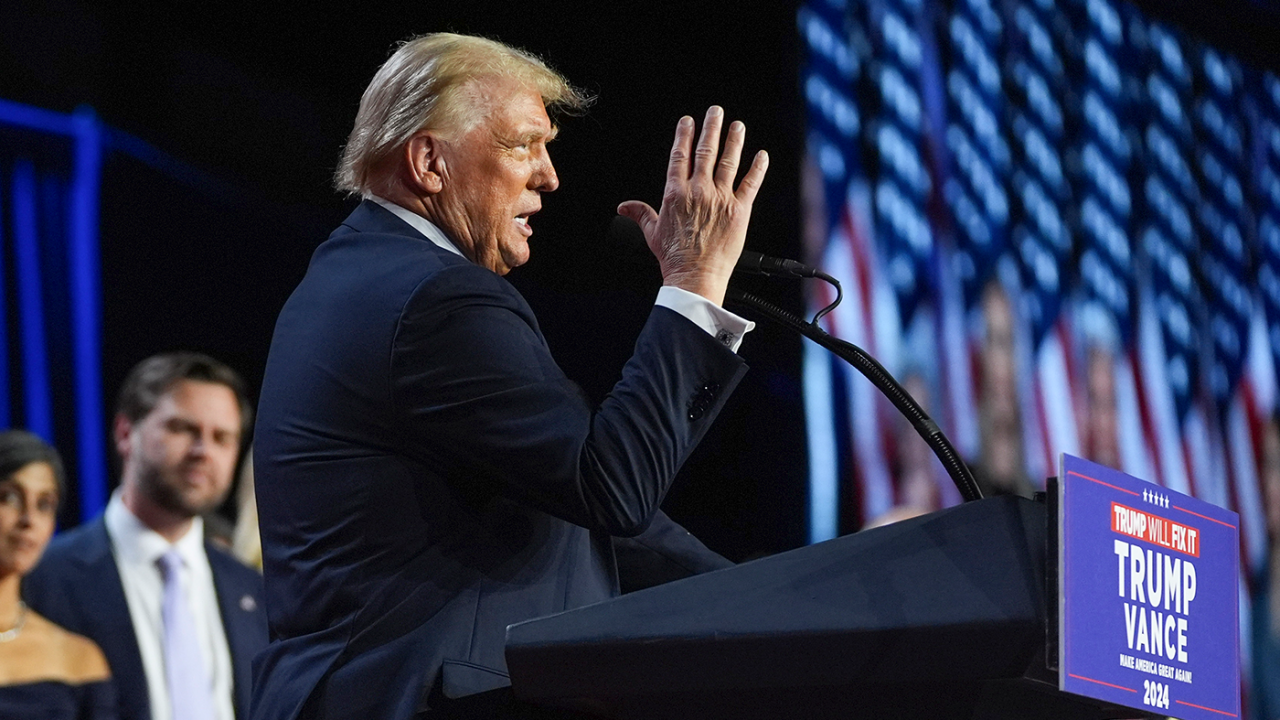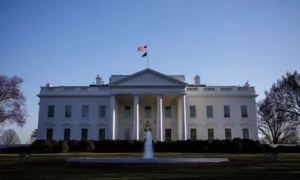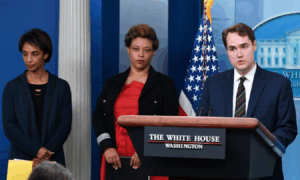President-elect Trump, Democratic lawmakers, and the Supreme Court are at odds over birthright citizenship restrictions, which Trump has highlighted as a primary objective for his future government.
Republican leaders on Capitol Hill claim that the text of the 14th Amendment, which guarantees citizenship to all people born in the United States, is being used in ways that the amendment’s framers never intended.
They believe Trump has the ability to restrict the interpretation of the 14th Amendment so that the children of foreign tourists, students, and other classes are not automatically granted citizenship if they are born on US territory.
They also claim that the conservative-leaning Supreme Court could find that certain types of immigrants on American soil are not necessarily subject to US jurisdiction, and so their children, if born in this country, are not eligible for citizenship.
“I’ve always thought it was a horrible law – to make everybody born here an automatic citizen. “I’d be all for making that change,” Sen. Tommy Tuberville (R-Ala.) said of Trump’s proposal to limit birthright citizenship.
During a recent appearance with NBC’s “Meet the Press,” Trump brought up the proposal without prompting.
The president-elect told NBC’s Kristen Welker that he intends to remove birthright citizenship through executive action, a proposal that has received praise from Republicans in Congress.
“We have to end it,” Trump declared, rejecting the long-held privilege as “ridiculous.”
Senate Republicans believe Trump will follow through on his promise and expect that the subject will finally be determined by the Supreme Court, which conservatives control with a 6-3 majority.
Sen. John Cornyn (R-Texas) remarked, “I’m going to take my cues from President Trump because nothing will happen without his support.”
Cornyn stated unequivocally that the 14th Amendment and birthright citizenship are being “exploited.”
“That will probably be decided ultimately by the Supreme Court of the United States,” he told reporters. “I would hope we would deal with some of the most egregious abuses.”
The 14th Amendment, ratified in 1868 in the aftermath of the Civil War, provides that “all persons born or naturalized in the United States, and subject to the jurisdiction thereof, are citizens of the United States and of the State wherein they reside.”
The term has typically been construed to grant citizenship to everyone born in the United States, including foreign citizens who are visiting or have illegally crossed the border.
However, conservatives say that it is time to rewrite the language to exclude persons who enter the United States specifically to have children on American territory in order to benefit from dual citizenship.
More broadly, they are considering preventing the children of any tourists who are not lawful permanent residents from getting automatic citizenship by proposing a new interpretation of the language “and subject to the jurisdiction thereof.”
Those seeking a new and more restrictive interpretation of the language argue that Native Americans born on reservations during the time the amendment was ratified were not subject to US jurisdiction and thus did not have full citizenship rights, despite being born within the country’s borders.
“The president and the Congress have the same authority to interpret the Constitution as the Supreme Court does. “It’s just that the Supreme Court has the final say,” said Mark Krikorian, executive director of the Center for Immigration Studies, which advocates for lower levels of immigration.
According to Krikorian, the president can narrowly interpret the 14th Amendment to prohibit the issuance of passports or Social Security numbers to neonates born to non-U.S. citizens or green card holders.
“Then it will get to the Supreme Court and we’ll see one way or another” how the case is decided, he said.
According to Krikorian, the framers and lawmakers who drafted and voted on the 14th Amendment in Congress and state legislatures “understood that to mean that children born to Indians living on reservations were not getting citizenship automatically, because [their parents] didn’t have citizenship until 1928.”
“The whole point of the amendment, what everybody who voted on it intended it to do, was to prevent the Southern states after the [federal Union] army withdrew from stripping the newly freed slaves from their citizenship,” he told reporters.
However, he argued that the framers never imagined that people from all over the world would come to the United States to give birth on American soil in order to reap the benefits of American citizenship — or that foreign students or seasonal workers would gain a permanent foothold in the United States by giving birth within its borders.
Under this “originalist” perspective, advocates for restricting birthright citizenship hope that the Supreme Court will agree with a potential Trump administration executive order that only residents who already have citizenship or legal permanent residency are fully “subject to the jurisdiction of the United States,” and thus domestically born children deserve citizenship.
Sen. Tim Kaine (D-Va.) is one of an increasing number of Democrats who are concerned that birthright citizenship may be jeopardized after Trump takes office, given the Supreme Court’s conservative leaning.
“He keeps returning to it. What struck me about [the] interview over the weekend was not that he said what he said, because he has said it before, but that he said it unprompted,” Kaine said of Trump’s call to end birthright citizenship during a sit-down interview with NBC last week, one of his first since being elected to a second term.
“He really got asked a question about mass deportation and building the wall but then he put the birthright citizenship in the middle of the answer,” according to Kaine.
“I think it would be foolish for us not to take it as a serious threat,” he told us.
Lawmakers believe Trump would try to limit birthright citizenship by administrative action because he would have no chance of gaining enough support to change the Constitution during the next four years.
Passing a constitutional amendment requires two-thirds support in each chamber of Congress and ratification by three-quarters of the states. Democrats would strongly oppose any attempt to limit birthright citizenship, according to politicians from both parties.
Kaine, a former federal appellate attorney, argues that the legal premise for reinterpreting the 14th Amendment’s “subject to the jurisdiction of” phrase is weak.
He claimed that such a unique interpretation of the law would weaken how criminal laws apply to undocumented immigrants and other tourists around the country.
“Then every person who gets arrested is like, ‘I can’t be convicted of a crime, I’m not subject to the jurisdiction of the United States,'” stated the man.
Kaine contended that the concept of being exempt from US jurisdiction has only applied to Native Americans with recognized sovereignty and foreign diplomats with internationally recognized legal immunity.
“If the framers of the 14th Amendment had said ‘any person born in the United States whose parents were subject to the jurisdiction of the United States’ then you might have an argument on undocumenteds, but they didn’t do it that way,” said Senator Kaine.
However, Republican lawmakers say that something must be done after an estimated 2.4 million migrants entered the country each year during Biden’s four-year term, signifying the largest immigration boom in US history.
Sen. Mike Rounds (R-South Dakota) said Trump is “more than welcome” to discuss birthright citizenship.
“It has worked in the past, but I also know that it has produced serious difficulties here because it has encouraged people to come in to have a child only to have a way in for their kids. But that causes major challenges for our system,” he explained.
In July, the Pew Research Center found that at least 1.3 million adults born in the United States are the children of undocumented immigrants.









